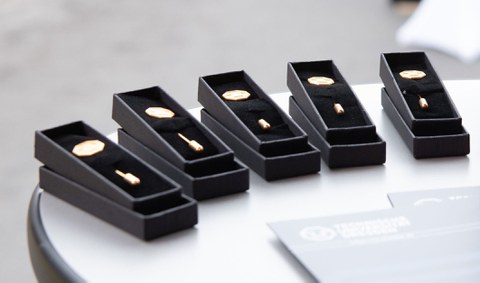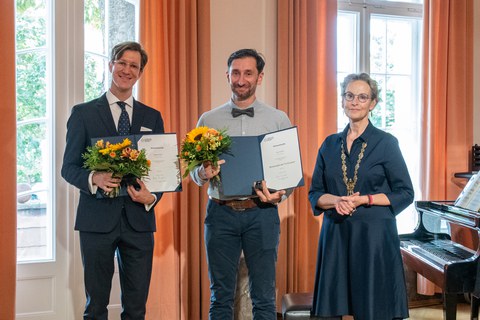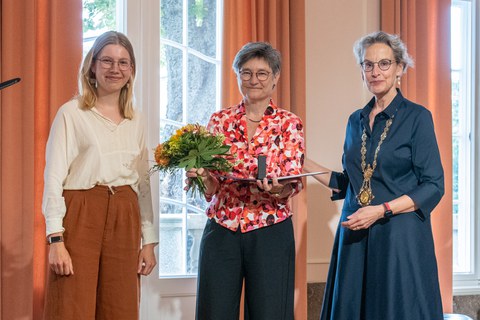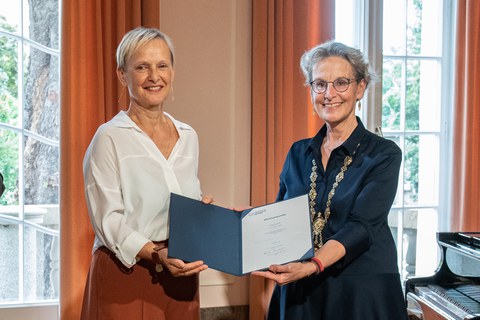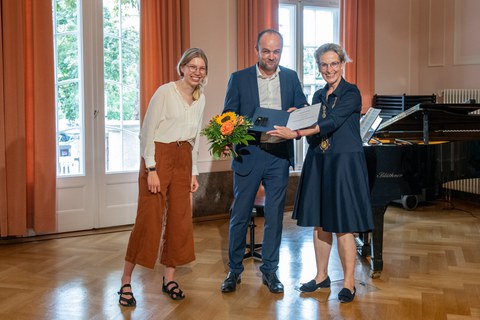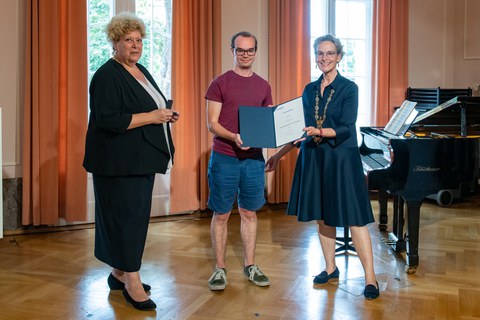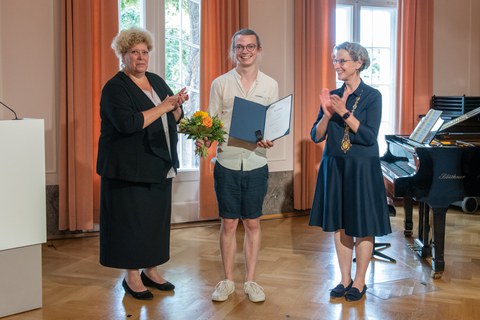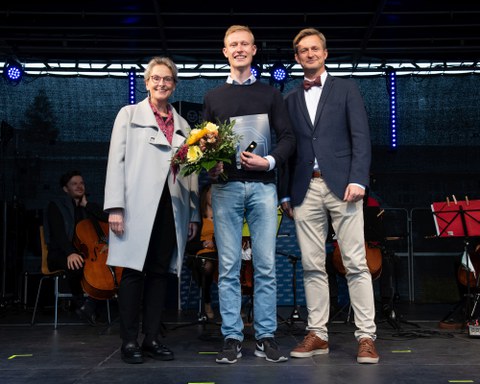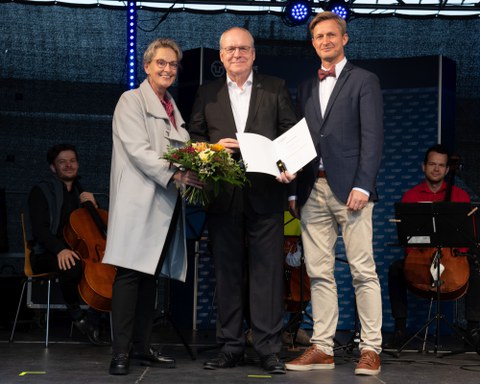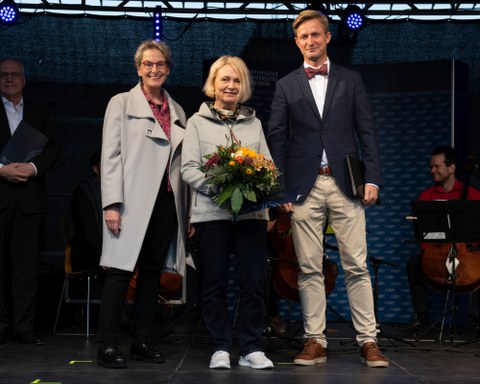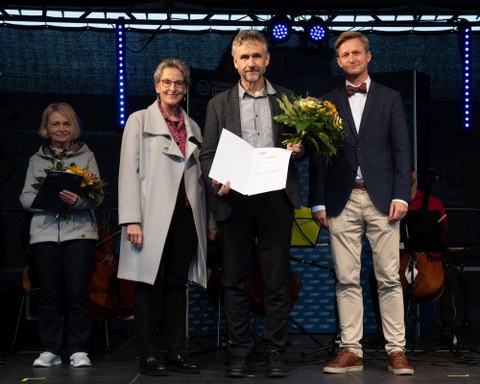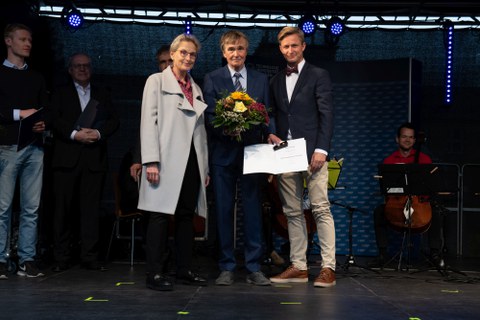Badge of Honor of the TUD
Table of contents
Proposals for awards with a badge of honor
Whether in teaching, research, studies or administration - creative ideas and great achievements are essential for the success of TU Dresden and should be honored accordingly. Members of the university are honored for their outstanding individual achievements and exceptional services to TU Dresden with the Badge of Honor. Nominations for the Badge of Honor can be submitted until 31 December of each year . Further information
Nomination form
Honored 2025
Prof. Dr. Gianaurelio Cuniberti
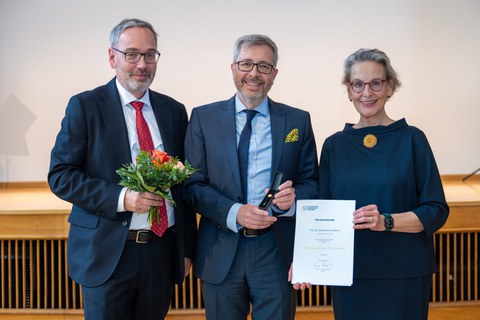
v.l.n.r. Kanzler, Prof. Gianaurelio Cuniberti, Rektorin
Prof. Dr. Gianaurelio Cuniberti has rendered outstanding services to the international reputation and visibility of TUD through his outstanding research and has made a formative contribution to its strategic development since his appointment in 2007. He developed an international network of researchers in the field of materials science based at the TUD. This includes more than 26 alumni from his group who are now working as professors at top international universities, numerous international visiting researchers (including Humboldt Award winners) and visiting and Honorary Chairs in Europe, North America and Asia. In addition, Prof. Cuniberti is a driving force in the strategic development of TUD's interdisciplinary research landscape. The "Dresden Center for Computational Materials Science (DCMS)" and "Dresden Center for Intelligent Materials (DCIM)", which he founded, bring together outstanding researchers from the respective fields. He has made and continues to make significant contributions to the success of coordinated projects (CRC 1415, RTG 2868) and plays a central role in three of TUD's current EXC applications. He has rendered outstanding services to cooperation between Germany and Italy at a scientific, economic and social level. These achievements were recently honored by the Italian President with the Order of the Star of Italy, the second highest civilian award of the Italian Republic.
GenderConceptGroup
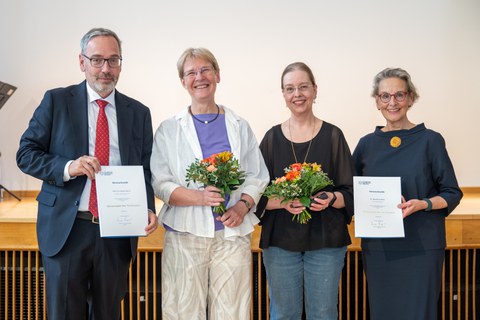
v.l.n.r. Kanzler, Prof.in Maria Häusl, Dr. Monika Valtink, Rektorin
Professors from the School of Humanities and Social Sciences have joined forces to form the GenderConceptGroup (GCG) with the aim of raising the profile of gender research at TUD. In cooperation with the School of Engineering Sciences and the School of Medicine, the GCG has been organizing the "Gender Lectures" since 2020, the aim of which is to discuss the relevance of gender studies in numerous disciplines and to enable current topics in gender studies to be offered as a continuous course at TUD. As a founding member, Prof. Dr. Maria Häusl is committed to bundling gender studies and researching the complex significance of the category of gender in all areas of life. Together with the other members, she has established research projects and developed the series "Dresdner Beiträge zur Geschlechterforschung in Geschichte, Kultur und Literatur". Inspired by the MEHRWERT project, Prof. Dr. Cornelia Breitkopf increased her focus on an interdisciplinary research perspective of gender and diversity aspects in the engineering sciences. In order to bring this perspective and discourse into her faculty and to sensitize colleagues and students to it, she organized colloquia with external advisors, for example. As a Research Associate at the Carl Gustav Carus Faculty of Medicine, Dr. Monika Valtink highlighted the special importance of gender research in medicine and its consequences due to insufficient consideration of gender. She was involved in organizing the Gender Lectures and held the position of Equal Opportunities Officer at the Faculty for many years. This interdisciplinary collaboration between the academics involved has resulted in important synergies for joint research and teaching. In addition, the GCG with its partly joint activities is an example of interdisciplinary cooperation at the TUD. The achievements of all three individuals are assessed as going above and beyond the general duty of service for their merits in science, teaching, knowledge transfer and exchange.
Prof. Dr. Christoph Haberstroh
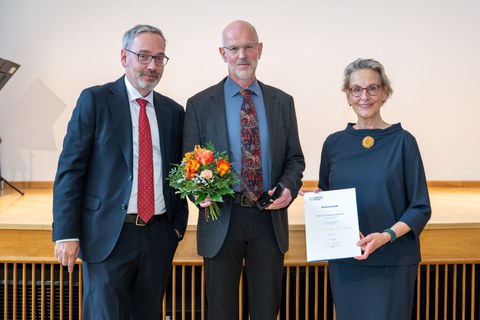
v.l.n.r. Kanzler, Prof. Christoph Haberstroh, Rektorin
Prof. Dr. Christoph Haberstroh has been Head of TUD Cryotechnology of the current Schaufler Chair of Refrigeration, Cryogenics and Compressor Technology at TUD since 1996 and has since then acquired countless direct industry, EU and DFG projects. Since his appointment, Prof. Haberstroh has enriched the Chair with his professional expertise beyond the expected level. His specialist background in physics and the application of physical laws and analytics to the engineering sciences is particularly noteworthy. The combination of basic scientific research with application in the field of engineering quickly led to the national and international recognition of his person, the Chair and thus the TUD. It is thanks to Prof. Haberstroh's foresight that he ensured that the TUD's first helium liquefaction plant was designed and built in 1994, the year he took up his post, which supplied large parts of the TUD's research infrastructure and external research institutions with liquefied helium for almost three decades. Due to the growing demand and the research questions formulated by Prof. Haberstroh regarding the optimization of helium liquefaction, storage and transfer to the end user, he wrote a DFG large-scale equipment proposal and thus raised the necessary funds for the construction of a new helium liquefaction plant. Prof. Haberstroh also has outstanding knowledge in the fields of cryogenic hydrogen technology and the liquefaction of helium and the associated processes, machines and measurement technology. Both industry and other research groups worldwide value his expertise beyond all measure. His commitment goes far beyond that of a team leader and associate professor in every respect. He has strengthened the visibility of the TUD in the field of cryogenics and improved research opportunities in this research area across faculty boundaries in the best sense of our 'Collaborative University'.
Dipl.-Ing. Christoph Peukert
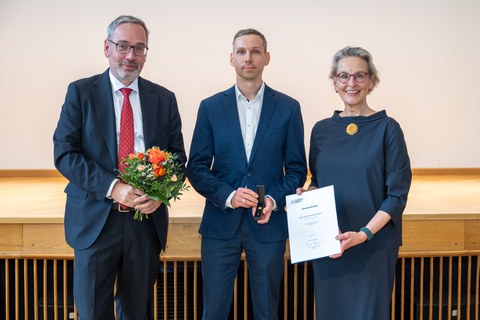
v.l.n.r. Kanzler, Dipl.-Ing. Christoph Peukert, Rektorin
The TUD thrives on people who enrich academic life with passion, vision and commitment. One of them is Dipl.-Ing. Christoph Peukert, who has rendered outstanding services through his voluntary commitment to the promotion of early-career researchers, especially in the engineering sciences. For many years, Mr. Peukert, a Research Associate at the Chair of Machine Tools Development and Adaptive Controls, has passionately dedicated himself to getting young people excited about technology and technical professions. As the driving force behind the VDI Future Pilots, he has organized innovative workshops and company tours. His creative formats, for example on the subject of quadrocopters or automated irrigation systems, make technology tangible. His credo is always "Join in, understand, take part!". In this context, his involvement in the Dresden Science Night, where he has been attracting numerous visitors since 2012 and has become a permanent fixture, deserves special mention. Since 2022, he has been involved in various formats of the TUD's school contact point, such as workshops as part of the Telekomstiftung's Junior Engineer Academy, with laboratory tours of machine tools, as part of the IT project days 'DIGITALL' or in international student projects. His formats are characterized by practical relevance, interactivity and passion - you will look in vain for theoretical slide battles with him. Christoph Peukert's commitment goes far beyond his official duties. With a great deal of idealism, drive and pragmatism, he overcomes obstacles to achieve his goal: To make technology tangible. He is not only a figurehead of the Faculty of Mechanical Science and Engineering, but also an indispensable ambassador for our university. For his outstanding commitment, we are honoring him today with the TUD badge of honor. Congratulations!
Fay Uhlmann
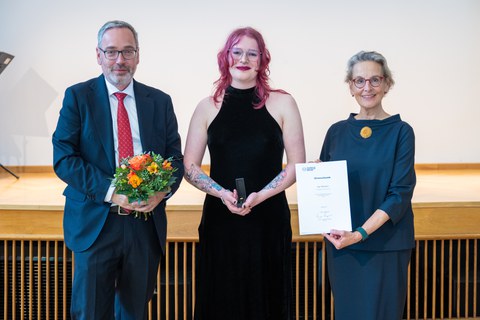
v.l.n.r. Kanzler, Fay Uhlmann, Rektorin
Fay Uhlmann, student in the Bachelor of Media Computer Science at the Faculty of Computer Science, has been committed to the interests of TUD and its students with a great sense of responsibility since 2020. With a focus on diversity, equality and psychosocial issues, Fay Uhlmann makes a significant contribution to strengthening campus culture. As a student senator and representative on the State Speakers' Council of the Conference of Saxon Student Bodies, Fay makes an important contribution to academic self-governance. Fay's commitment is evident in projects such as the installation of all-gender toilets, which set a practical example for respect and inclusion. At the same time, Fay's commitment to student self-government strengthens the TUD's position at state and federal level. Fay Uhlmann also brings a high level of expertise to strategic processes such as the "Shaping Diversity" audit and is a sought-after person at events such as the Queer Science Panel. Fay has the ability to provide valuable impetus that contributes to the further development of the university structure. Through her involvement in the Conference of Saxon Student Bodies and in the free association of student bodies, Fay Uhlmann also effectively represents the interests of TUD vis-à-vis politics and society. In conclusion, it can be said that Fay Uhlmann's courageous commitment contributes to the constructive further development of the topic of "diversity" in the university landscape and a positive external perception of TUD in this respect.
Dipl.-Ing. Dirk Weiß
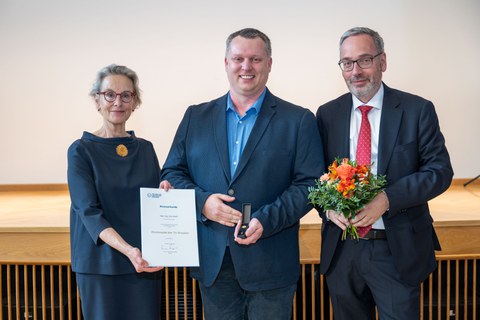
v.l.n.r. Rektorin, Dipl.-Ing. Dirk Weiß, Kanzler
Dipl.-Ing. Dirk Weiß works at the Institute of Building Climatology (IBK) at TUD; his impressive commitment there goes far beyond the general duty of service, because with his outstanding work in Dresden and throughout Germany, he has made a significant contribution to taking TUD to a new level in research, teaching, transfer and practice. This was done, for example, through the development of a digital campus twin for the "climate-neutral campus" or the scientific support of lighthouse projects for sustainable building and district development (EU project NEUTRALPATH). Winning the Saxon State Building Award demonstrates the excellence of his projects in the innovative and socially useful combination of science and practice. He deserves special recognition for his tireless commitment, involving many additional hours of work, to the further development of the IBK test laboratory, a test bench that is unique in the world and whose completion has made a significant contribution to the scientific excellence of the Institute. He has also made his mark at national and European level. His involvement in the Wissenschaftlich-Technische Arbeitsgemeinschaft für Bauwerkserhaltung und Denkmalpflege (WTA) e.V., in particular for changes to guidelines and the further development of jurisdiction in engineering, demonstrates his vision for future-oriented and sustainable construction planning. Dirk Weiß is also a role model for courage and innovation. With his own residential building project, he has proven how to transfer scientific findings into practice. In doing so, he took a risk without funding and made all research data freely available in order to promote progress in this field. Dirk Weiß promotes the innovative strength, commitment and scientific depth of the TUD through his pioneering work at the IBK. His work contributes significantly to the energy transition and climate protection and is therefore invaluable not only for the university, but also for society.
Dipl.-Sociol. Anja Wiede
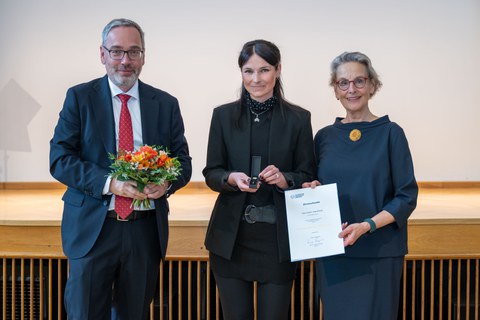
v.l.n.r. Kanzler, Dipl.-Soziol. Anja Wiede, Rektorin
Dipl.-Soziol. Anja Wiede has rendered outstanding services to the TUD. With her pronounced initiative, professional competence and commitment, she has shaped anti-discrimination work and the development of an inclusive university culture. As the contact person for the Complaints Office for Harassment, Discrimination and Violence, initially as a volunteer and later as a regular employee, she takes her task of neutrally examining complaints and proposing measures with a particular sense of responsibility. In addition to her regular duties, she has shown outstanding commitment in setting up the compliance management system, in particular the "Compliance in cooperation" pillar. She proactively sets new standards in prevention and independently develops advisory services as well as empowerment and awareness-raising formats. Her target group-specific workshops on sexualized violence and discrimination, which she designs independently, receive consistently positive feedback. She is highly committed to organizing events for international days of action such as those against homophobia or racism in order to raise awareness. She uses her extensive network innovatively and profitably for the TUD. Her commitment to the action plan against anti-democratic challenges, which was initiated by her, is a central building block for the university's democratic profile. She is also active in the anti-racism/criticism of racism working group, where she continuously contributes new ideas.
Award winners of the past years
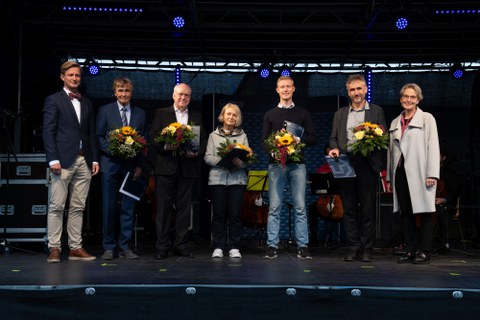
v.l.n.r. Dr. Andreas Handschuh (Kanzler), Prof. Dr. Kai Simons, Prof. Dr. Manfred Curbach, Prof.in Dr. Ellen Hieckmann, Alexander Busch, Prof. Dr. Michael Kobel (Auszuzeichnende), Prof.in Dr. Ursula M. Staudinger (Rektorin)
Award-winning 2024
Prof. Dr. Frank Almai
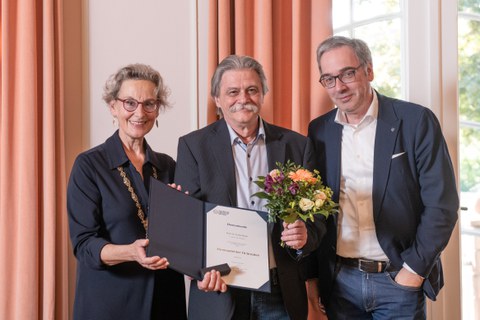
v.l.n.r. Rektorin, Prof. Dr. Frank Almai, Kanzler
Prof. Dr. Frank Almai is one of the most important figures of experience and continuity at TUD Dresden University of Technology - above all due to his achievements during the start-up phase in 1990, when the University of Education was incorporated into the new German Studies department at TU Dresden. Not least due to his outstanding personal commitment, he played a key role in shaping the development of literary German studies as a mainstay. With the utmost reliability, he took on the complex coordination of the chair and its business with numerous ongoing third-party funded projects. His achievements in teaching are closely linked to his services to the restructuring of TU Dresden and his research activities. For more than three decades, he has been one of the most respected and effective lecturers in the field of German literature and has influenced countless generations of teachers of all types of schools as well as prospective academics. It is not only the quality of his teaching, which has been attested to in many evaluations, and the enormous number of theses he has spent a great deal of time supervising that distinguish him here, but also the fact that he has repeatedly designed and coordinated the important central introductory courses and introductory modules on his own initiative. In terms of conception and implementation, he made a significant contribution to modernizing teacher training in the field of German literature. His consistent collegiality, which he demonstrated in his collaboration with younger colleagues, was also a key success factor here.
Dr. Anja Blüher
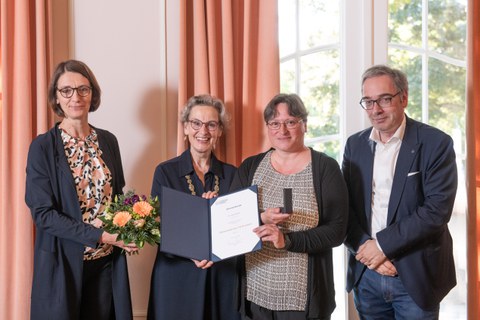
v.l.n.r. Prorektorin Universitätskultur, Rektorin, Dr. Anja Blüher, Kanzler
Since 2019, Dr. Anja Blüher has been contributing to improving the situation of female students and scientists in the qualification phase as Equal Opportunities Officer in the School of Engineering Sciences. In view of the persistent underrepresentation of these groups in the engineering sciences, continuous efforts and a needs-oriented welcome and retention policy are required. She is actively involved in measures of the TUD's Equality Concept, developed the Equality Plan 2020 to 2030 in the School of Engineering Sciences and proactively initiates formats at the level of subject cultures. Dr. Blüher's great concern is to work in a networked and interdisciplinary manner for the TUD. As co-organizer of the "International Day of Women and Girls in Science", she raises awareness of the situation of women and girls in science and encourages them to follow their passion. As a co-founder of the NExT postdoc forum, she promotes professional networking between women in various disciplines and works with the GenderConceptGroup to integrate gender and diversity aspects into research and development. In addition to her commitment to gender equality, Dr. Blüher works as a science manager in the School of Engineering Sciences in strategic processes and accompanied the Energy Research Strategy. Promoting diversity in science is a matter close to Dr. Anja Blüher's heart. She sees this as a strategic necessity for the sustainable and inclusive development of our university.
Emergency Response Team IT ING 2023
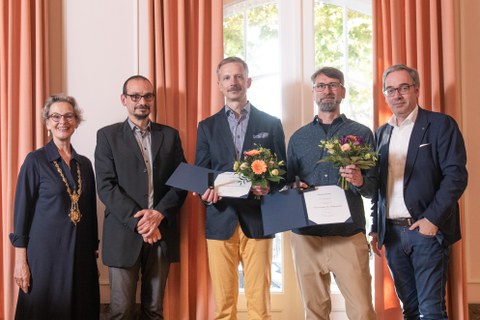
v.l.n.r. Rektorin, Dr. Matthias Voigt, Matthias Rack, Nick Dannenberg, Kanzler
The IT ING 2023 emergency response team demonstrated outstanding crisis management during the IT security incident. This performance is exemplary both for the cooperation across divisional and departmental boundaries and for the high level of individual commitment of the IT employees. In 2023, a hacker attack on the systems of the School of Engineering Sciences required a special effort. Here, the spontaneously formed emergency team consisting of members of the CERT, the School of Engineering Sciences IT officer and the CDIO IT officer in collaboration with other colleagues from the ZIH and School of Engineering Sciences excelled. By reacting quickly within a few hours of becoming aware of the threat, it was possible to ensure that no data could flow out of the School of Engineering Sciences division's systems to the attackers. Once the immediate threat had been averted, the team excelled in its coordinated cooperation with all affected departments in IT, Central University Administration and the division. In particular, the good crisis communication, the quick and coordinated restart in consultation with all administrators and the coordinated protective measures in other organizational units were highly praised by all those involved. The team's trusting cooperation both with each other and with external bodies, as well as their level-headed, professional and efficient actions in the event of a crisis, set an example for all TU Dresden employees.
Kristin Fiedler
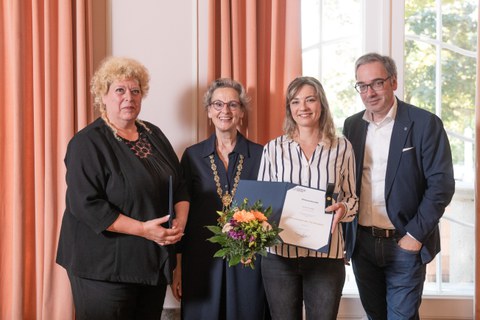
v.l.n.r. Katrin Maurer, Rektorin, Kristin Fiedler, Kanzler
Kristin Fiedler is a TUD student with a particular commitment to climate protection and sustainability as well as equal opportunities and equality. She is involved in sustainability and environmental protection in various projects such as AG Save the Power, Structure, Upcycling of the TU Environmental Initiative (tuuwi). It is very important to her to represent these topics not only in student teaching. She has been involved in environmental ring lectures and the development of environmental guidelines. She designed and organized offers in the field of education for sustainable development (ESD) such as workshops, e.g. on high-quality education. As a member of the student initiative and university group Was tun! Initiative for Systemic Sustainability, she was involved in the amendment of the regulations of the Environment Commission (KU) and in the development of the concept of the now established Green Office at TUD. As a Green Office starter project, she designed and led the award-winning educational concept Basic Lecture on Ecological Sustainability together with other students. This successful series of events organized by the ESD department informs interested members of urban society about climate change issues and is to be firmly anchored in the curricula of degree programs. In the Environment Commission, Kristin was actively involved in the working groups Sustainability Strategy, Education for Sustainable Development at the KU and Biodiversity and Ecosystem Services. Kristin Fiedler is also involved in the area of equal opportunities and gender equality. For example, she was involved in the TUD's Women's Environmental Network.
Prof. Dr. Stefan Gumhold
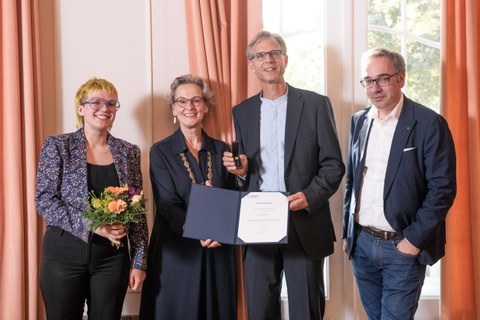
v.l.n.r. Helene Müller, Rektorin, Prof. Dr. Stefan Gumhold, Kanzler
Prof. Dr. Stefan Gumhold, Chair of Computer Graphics and Visualization at the Faculty of Computer Science, has been committed to promoting sustainability and environmental protection at TU Dresden for many years. He has been Chairman of the Environment Commission since 2018 and has played a key role in shaping the university's strategic direction in this area. Under his leadership, the Environment Commission was reconstituted and given increased action-taking capacity. The sustainability strategy for TU Dresden, which was developed with the significant involvement of the Environment Commission, is particularly noteworthy. This strategy represents the university's commitment to transformation and sustainable development. Prof. Gumhold strives to reach and inspire all members of the university on the path to a more sustainable TU Dresden. As head of the "Digitalization and Sustainability" working group within the Environment Commission, he actively contributes to developing innovative approaches that combine digitalization and sustainability. Prof. Dr. Stefan Gumhold is an outstanding example of a scientist who sets standards not only in his field, but also in matters of societal responsibility. His tireless efforts have been instrumental in driving TU Dresden towards a more sustainable future.
Christiane Lisa Iden
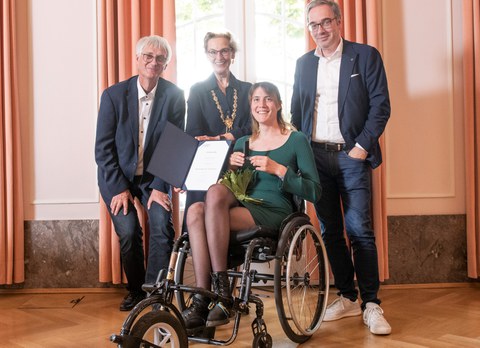
v.l.n.r. Prof. Dr. Thorsten Claus, Rektorin, Lisa Iden, Kanzler
Christiane Lisa Iden studied mathematics and transportation sciences at TU Dresden. Since 2018, she has had a significant influence on the strategic direction and university culture of TU Dresden in terms of inclusion and accessibility. Her commitment has not only been at the level of our university (FSR, StuRa), but also at state and national level. She contributed her wealth of experience to the Conference of Saxon Student Bodies (KSS). On her initiative, a working group on inclusion was founded in the Free Association of Student Unions (fzs). Her ambitious actions in academic self-administration go far beyond the normal scope of a student representative and have always been characterized by empathy, a sense of responsibility and a solution-oriented approach.
Prof. Dr. Daniel Leising
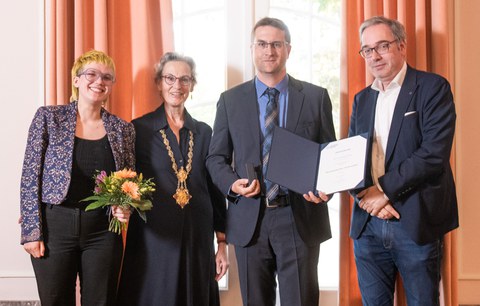
v.l.n.r. Helene Müller, Rektorin, Prof. Dr. Daniel Leising, Kanzler
Prof. Dr. Daniel Leising has proven to be a driving force for a culture of integrity and respect at TU Dresden through his outstanding commitment against abuse of power by leaders in academia. His efforts span various levels and formats, both inside and outside the university. Particularly noteworthy is his active role in the Science Forum on Power and Abuse of Power and his involvement in the Network against Abuse of Power, contributing to raising awareness and proactively taking responsibility at TU Dresden and fighting for higher quality standards in science and research. In his courses, he not only imparts professional competence, but also encourages students to think critically about existing practices in science and promotes interdisciplinary skills and awareness of the societal responsibility of researchers. Through its participation in the Open Science Initiative, it significantly supports research transparency and integrity. The empirical foundation of his commitment, based on psychological research, underlines the depth of his commitment to good scientific practice. Prof. Dr. Leising embodies a role model for the academic community through his ethical stance and his dedicated work. His commitment to a responsible scientific and leadership culture at TU Dresden deserves the highest recognition.
Award-winning 2023
"University culture-political TEAM Jessica Flecks and Barbara Hoffmann "
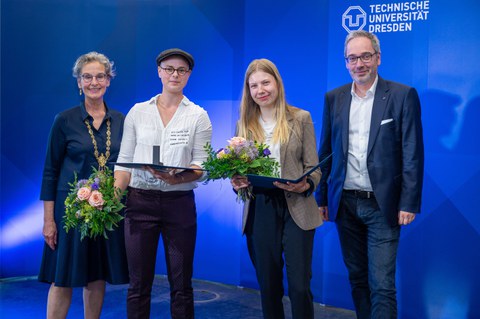
Rektorin, Barbara Hoffmann, Jessica Flecks, Kanzler (v.l.n.r.)
Jessica Flecks and Barbara Hoffmann have been involved at TU Dresden for several years in an outstanding way, especially as a unicultural-political team that enlivens campus life in the areas of university politics, teaching, sustainability, diversity and inclusion as well as student health. Their work at several levels of our Universitas (FSR SLK, tuuwi, FakRat SLK, Senate and its committees) is decisive for their joint successes. One example of their joint commitment is the "One University - One Book" competition organized by the Stifterverband, in which the two students were successful with a concept for the novel "Über Menschen" (Juli Zeh). The team also worked to improve the quality of teacher training by consolidating the accompanying course Theater - sehen, denken, spielen (SLK). Jessica Flecks and Barbara Hoffmann have been involved in the Senate for two and one term respectively, focusing on teaching and studies, ecological sustainability, equal opportunities and diversity. As a unicultural-political team, Jessica Flecks and Barbara Hoffmann have repeatedly provided impetus to improve living, learning and working together at our university and have shown the influence that student engagement can have at faculty and university level. This achievement is exemplary and not only exceeds expectations, but also sets new standards for comprehensive commitment across content-related and structural boundaries, which can serve as motivation for other students in the future.
Prof. Dr. Chokri Cherif
Prof. Dr. Chokri Cherif has rendered outstanding services to the reputation of TU Dresden. He has shaped the national and international research landscape in textile technology and has an excellent network with active contacts to over 400 German and international companies and research institutions. He is excellently integrated at TU Dresden. His interdisciplinary research makes outstanding contributions to the Research Priority Areas at TU Dresden. He cooperates with colleagues from twelve faculties. This is impressively demonstrated by a large number of joint research initiatives that sustainably strengthen the profile of our university. Examples include the areas of carbon concrete, the SFB Transregio 280 and the highly interdisciplinary EXC CETI project. He is also involved in other planned projects, e.g. an SFB initiative on lignin-based carbon fibers under his leadership. Thanks to his extraordinary commitment and success in opening up new fields of application for high-performance textile materials, his Institute's third-party funding has increased from around 900,000 euros to over 7 million euros (2022) since his appointment in 2005. During this period, he has registered over 250 patents and received at least 108 awards for special scientific achievements from him and his staff. Particularly noteworthy is the Federal President's Future Prize for Innovation and Technology in 2016 for the invention of carbon concrete. Last but not least, the very international research team of his chair, his involvement in the Association of Textile Universities (AUTEX) and in particular its international degree program E-Team, the DAAD Master's program with its international graduates or the very successful Aachen-Dresden-Denkendorf International Textile Conference (ADD-ITC) with around 700 international participants promote the international visibility of TU Dresden to a special degree. All these achievements make Prof. Cherif an outstanding contributor to TU Dresden.
Prof. Dr. Thomas Günther
In his 28 years at TU Dresden, Prof. Dr. Thomas W. Günther has rendered outstanding services to the university and the reconstruction of the Faculty of Business and Economics after reunification. His teaching portfolio includes twelve modules, which are placed in both the undergraduate and advanced study areas of several degree programs. Due to his close links with controlling practice, he always incorporates current, practice-relevant teaching content into his teaching. He also focuses on establishing internationally recognized research. In this context, he has succeeded in writing or co-authoring around forty high-quality research articles in the last ten years alone. This has also enabled around thirty doctoral students to complete their doctorates at a high level. He also deserves special respect because he has been diagnosed with the neurodegenerative disease ALS since 2018, which has never prevented him from maintaining and in some cases even expanding his ambitious teaching and research program. With the help of work assistants, who in particular replace his lost motor skills, he is unwaveringly involved in all matters concerning the faculty and the chair and, with his outstanding achievements in teaching and research and, in particular, his remarkable, positive personality, is a true inspiration for his professional environment and for the entire TU Dresden.
Jan-Malte Jacobsen
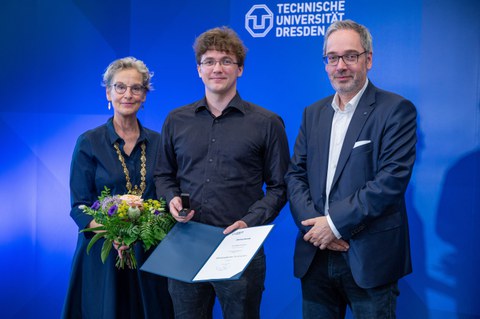
Rektorin, Jan-Malte Jacobsen, Kanzler (v.l.n.r.)
During the course of his studies, Jan-Malte Jacobsen held a large number of voluntary positions on various committees. Particularly noteworthy is his extremely professional involvement in the university elections of the last three years and thus his extraordinary commitment to the democratic structures of the university. His work as a student member of TU Dresden's election committee and as the student body's election officer from 2019 to 2022 contributed significantly to the smooth running of the elections. Additional coordination with the election committee and the election office was necessary, especially in the wake of the coronavirus pandemic and the enactment of special election regulations. The postal-only elections in 2020 and 2021 required the planning and error-free implementation of new processes and the use of electronic forms. Malte Jacobsen played an active role in this and contributed constructively. Thanks to his ideas and expert guidance of the election workers, the postal votes and the extensive logistics behind them were successfully carried out. He led the team of the student body's election committee in a level-headed, mediating and goal-oriented manner. Cooperation with the university's election office was also excellent. Jan-Malte Jacobsen was also active in the Faculty Student Council for Mechanical Engineering, where he held the position of spokesperson for two years. He has also been an impressive student representative on the Faculty Board, the Study Commission, the Examination Committee and as course coordinator for Process Engineering. Jan-Malte Jacobsen has been active in the Student Council's Technology Department for many years. He also took on responsibility in university politics and held the position of Managing Director for University Politics of the Student Council. In the 2015/2016 legislature, he was active as a student senator. His involvement in numerous aspects of university politics is characterized by his wealth of experience and his sociable, diplomatic manner. With foresight and perseverance, he also supports younger volunteers and is a role model both professionally and personally.
Dr. Karin Rühling
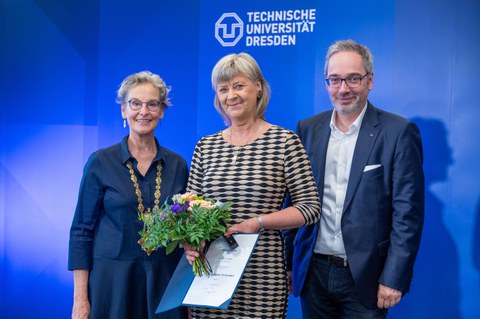
Rektorin, Dr. Karin Rühling, Kanzler (v.l.n.r.)
Dr. Karin Rühling is co-initiator, idea generator and one of the intellectual authors of the establishment of the Center for Energy Technology. With great enthusiasm and expertise, she designed the basic concept for this interdisciplinary laboratory and brought it to fruition not only during the planning phase, but also during the construction phase. With her scientific expertise, visionary thinking and exceptional commitment, she pointed out innovative solutions and alternatives and thus helped to overcome one or two hurdles. She also played a key role in the establishment of the Renewable Energy Systems degree program. She is an honorable university lecturer, always appreciated and respected by the students. She has not only contributed her experience and expertise to the courses, but has also played an extremely active and indispensable role in the teaching quality assurance committee for many years. She has acquired an above-average amount of third-party funding for our university and is a nationally and internationally recognized representative of TU Dresden in many specialist and standardization committees.
2022 awardees
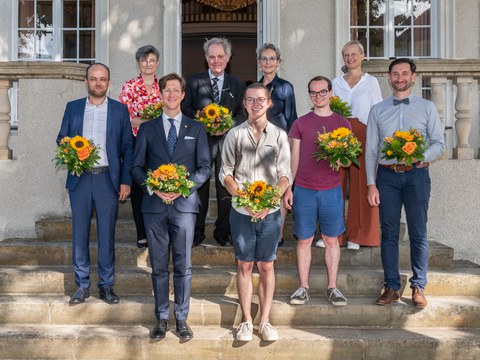
Front row from left to right: Prof. Alexander Lasch, Martin Holst, Lutz Thies, Paul Senf, Jens Strehle. Top row from left to right: Prof. Uta Berger, Prof. Peter Paufler (Medal of Honor), Rector, Petra Bril. Unfortunately, the honorees David Jugel and Claudia Meißner could not attend the event.
Whistleblowers Martin Holst and Jens Strehle
The courage with which the two whistleblowers pointed out the serious violations of scientific integrity in the context of the PPP study, thus enabling an investigation and disclosure, deserves our highest appreciation. Maintaining academic integrity is key at our university. The responsible actions of the two whistleblowers must therefore be seen as an outstanding commitment to the benefit of TU Dresden in its entirety.
Prof. Uta Berger
Prof. Uta Berger’s commitment to TU Dresden can be described as outstanding, especially in view of its breadth. As scientific director of the Centre for International Postgraduate Studies of Environmental Management (CIPSEM), she not only redesigned the content and structure of this continuing education program in the field of environmental management for international decision-makers in cooperation with UNEP, UNESCO and the Federal Ministry for the Environment, Nature Conservation and Nuclear Safety (BMUV), but also supported the integration of innovative digital teaching and learning formats – even before the pandemic – which are exemplary for new concepts of virtual, international university teaching. Her scientific excellence is thus demonstrated by her ongoing publication record with an H-lndex of 32 (Scopus). In addition, her work in various committees, such as the University Council of TU Dresden (2016–2020), the DFG Review Board (FK 207-06 since 2016), and her work as a Heinrich Böll Foundation Trusted Lecturer (since 2012), among others, again shows a spectrum that demonstrates both her strategic academic commitment and her dedication to teaching and students.
Petra Bril
Petra Bril took her first steps in the field of digitalization in 1975 at TU Dresden. Since then, she has consistently demonstrated great commitment in feeding the room and building database and laid the foundation for the expanded database in the current SAP awards module Flexible Real Estate Management. “A large part of providing the data for the Campus Navigator can be attributed to her persistence.” A particularly major contribution of her heartfelt desire to make administrative processes more efficient was to familiarize her colleagues with the software, to enable them to use it and to inspire them to continue using it. “It’s the quiet, tireless colleagues in the background who lay a stable foundation.”
David Jugel
David Jugel is currently completing work on his dissertation at the John Dewey Research Center for the Didactics of Democracy. He deserves our recognition because of his extraordinary commitment to improving teacher education at TU Dresden and in Saxony, which has remained unwavering since he himself was a student. He was involved both in the Academic Affairs Committees for teaching and was a program coordinator in the Master’s degree program for teaching at high schools (Gymnasien). He participated extensively as a TUD representative in the approval process of the State Examination degree programs for middle schools and high schools. Furthermore, he also contributed to many other committees with an extraordinary commitment to achieve the common goals of TU Dresden.
Prof. Alexander Lasch
With the onset of the COVID-19 pandemic, the topic of digital university teaching became a central issue at TU Dresden. Many instructors faced completely new challenges in the task of translating their established courses into a virtual space within a very short time. In this situation, Prof. Alexander Lasch, with his enormous commitment and great expertise, collected information and experience on digital tools and made them available to the whole university so that all lecturers could benefit from them. These suggestions and assistance have played a significant role in ensuring that online teaching is implemented successfully at TU Dresden and that TU Dresden has achieved a new level of quality in this dimension.
Claudia Meißner
Academic and student self-government are essential pillars of a university’s autonomy. Claudia Meißner has been a passionate advocate for disadvantaged people and cases of social hardship both as a Senator and Faculty Councilor and as the Executive Director of Social Affairs for the Student Council. “Many student initiatives, campaigns and events would not have been possible without her and her selfless commitment.” She also represented our university culture, particularly in the areas of inclusion, equality, and diversity, in student advocacy groups at the state and national levels. “She has not only helped countless students, but has worked to an impressive degree to make TU Dresden a university for all its members.”
Paul Senf
Paul Senf is one of the most committed student representatives of our university. He is questioning, critical and constructive within TU Dresden in the Senate, in the Extended Senate, in the Faculty Board, the Standing Commission of the Senate on Teaching, in the Planning Staff for Teaching and in the Student Council, but also on the state level as speaker of the Conference of Saxon Student Bodies. He displays exceptionally tireless commitment to the students and the entire university. Especially during the pandemic, he tirelessly and thoughtfully advocates for study and examination conditions that are fair and suited to everyone with an eye on the big picture. He is a Master’s student of Mathematics, the speaker for teaching and studies in the Student Council, and level-headed in everything he does.
Lutz Thies
Lutz Thies represents the interests of students to an above-average degree. However, he has done outstanding things not only for the students, but for the entire university. He contributes constructively and purposefully to numerous committees and various platforms, particularly on the topics of teaching, studying and climate justice. Open-mindedness, tolerance and the promotion of democracy are other topics that move him tirelessly and for which he is involved with numerous initiatives. In academic self-administration, he was active as a member of the Faculty Board of the Faculty of Computer Science, the Senate and the Extended Senate, as well as the Standing Committee of the Senate on Teaching and the Planning Staff for Teaching. In addition, he helped shape the public relations work of the student council with numerous ideas, worked to increase visibility and promote student involvement, and is also active in university work in the DGB Youth of Saxony. His commitment together with the TU Dresden’s environmental initiative tuuwi is primarily focused on a sustainable and ecological design of the TU campus as well as questions of climate neutrality.
Alexander Busch
Since the beginning of his studies, Alexander Busch has been active in numerous structures of academic and student self-government. With his extraordinary commitment, he did outstanding work not only for the students but for the entire university. For example, in 2017 he rebuilt the public and press relations in the executive board of the student council and was also a member of the plenum of the student council as executive director. Mr. Busch was instrumental in founding the group “WHAT – know, act and actively participate” to sensitize young people to socio-political issues and to campaign against racism and xenophobia. With the call for personal engagement and participation in the committee work of TU Dresden, he could contribute to the increase in the turnout for the academic and student elections. Alexander Busch is at the end of his studies in the Mechanical Engineering Diplom degree program and was most recently a member of the Senate and its Standing Committees.
Prof. Manfred Curbach
Prof. Manfred Curbach always stands up for the interests of TU Dresden with his fullest commitment. He has done pioneering work in the field of textile and carbon concrete and is particularly well networked in the scientific community. He was responsible and very successful for one term of office as TU Dresden’s Vice-Rector University Development. Prof. Curbach stands equally for interdisciplinarity, internationality and successful technology transfer and is an astute and profound contributor to the university’s committees. Since 1996, Prof. Curbach has held the professorship for solid construction at the Faculty of Civil Engineering and has been a member of the National Academy of Sciences Leopoldina since 2013 as well as spokesperson of the BMBF consortium “C³ – Carbon Concrete Composite.” In 2016, he was awarded the German Future Prize, the German President’s Award for Technology and Innovation.
Prof. Horst-Peter Götting
Prof. Dr. Horst-Peter Götting played an extraordinarily constructive role in the formation of the School of Humanities and Social Sciences as Dean of the Faculty of Law at TU Dresden from 2010 to 2016. His always goal-oriented pragmatism has given way to numerous solutions that have led to the promotion of consensus-based decisions and processes in the field. In addition, he mastered the challenge of integrating the Faculty of Law into the Faculty of Arts, Humanities and Social Sciences in an exemplary manner, for which Mr. Götting deserves unreserved recognition for creativity. Prof. Götting initiated the postgraduate degree program “International Studies in Intellectual Property Law,” which was awarded by the Stifterverband der Deutschen Wissenschaft. From 2005 to 2020, he was Director of the Institute of Intellectual Property, Competition and Media Law (IGEWeM).
Prof. Ellen Hieckmann
Prof. Ellen Hieckmann has been involved in various committees of the academic self-administration of TU Dresden for several years. As an elected member of the Senate, for example, she was very committed to the interests of the academic staff of TU Dresden. She is active both as the Equal Opportunity Officer for the Faculty of Physics and as the Equal Opportunity Officer for the School of Science. Especially in this scientific field, where the number of representatives of all genders in leading positions remains unbalanced, her competent participation in appointment procedures – from the announcement to the list proposal – plays an important role. In addition, she actively participated in the creation of the Equality Concept, which was updated in 2018, and decisively professionalized equality work. Her manner of working is characterized by excellent preparation, smart involvement of key stakeholders and integrity.
Prof. Michael Kobel
Prof. Michael Kobel combines scientific and social commitment like hardly anyone else, proving that science is tied to a free and democratic society and is inconceivable without social responsibility. He is outstandingly dedicated to making research findings accessible to all and to strengthening trust in science and democracy. Prof. Kobel was the initiator of the “March for Science” in 2017 and is co-founder of an interdisciplinary working group at TU Dresden for creating further communication spaces for critical reflection on controversial scientific topics such as climate change or vaccinations. Prof. Kobel co-developed the event series “TU Dresden in Dialogue” and was instrumental in the conception of the series “Diversity in Dialogue,” which engages the public in conversation with various civil society cooperation partners on topics such as migration and integration. Prof. Kobel is a forward-thinking advocate for everyone’s interests and often acts as mediator between students, staff and professors.
Prof. Kai Simons
An outstanding scientist, Prof. Kai Simons came to Dresden in 2000 as one of the initiators of the Max Planck Institute for Molecular Cell Biology and Genetics (MPI-CBG), led the MPI-CBG as its first managing director, and has acted as a tireless driving force for biosciences and biotechnologies at the Dresden site with reach far beyond the institute’s borders. His initiative, energy and vision played a decisive role in establishing Dresden as a global location for biotechnology and in making the life sciences an important pillar of TU Dresden’s excellence strategy. As a professor in the Faculty of Medicine at TU Dresden, he played a key role in planning and shaping the teaching of the life sciences and served as a member of the University Council of TU Dresden.
Prof. Gerhard Fettweis
Prof. Fettweis has held the Vodafone Endowed Chair for 25 years. Since then, he has been one of the formative players in all three dimensions of TU Dresden – teaching, research and transfer. Prof. Fettweis understands how to acquire outstanding large-scale scientific projects such as the cfaed Cluster of Excellence and the HAEC Collaborative Research Center as well as how to cultivate the supervision of early-career scientists to a very special degree. To date, more than 280 theses and more than 90 doctorates have been completed under his direction of his Chair. He has supported more than a dozen spin-offs –including RadioOpt in 2008, Blue Wonder in 2008, In Radios in 2010, Hightech Startbahn and Startbahn Venture Funds in 2012, to promote the start-up scene in Dresden, and 5G Lab Germany in 2015 – helping to successfully establish them on the market or have been integrated into other companies and increase society’s awareness of TU Dresden. He has been a member of the Senate of the German Research Foundation since July 2019. Prof. Fettweis has rendered outstanding services to TU Dresden through his work.
Prof. Wieland Huttner
Prof. Huttner has been Director at the Max Planck Institute of Molecular Cell Biology and Genetics in Dresden since 1998 – now emeritus – and Honorary Professor at TU Dresden. The foundation of the DRESDEN-concept research alliance – which today is a model of cooperation between university and non-university research institutions for the whole of Germany and attracts worldwide attention – is largely due to the efforts of Prof. Huttner. To this day, he is a member of the Executive Board and repeatedly sets impulses for a strengthening of the ties between DRESDEN-concept partner institutions. In addition, Prof. Huttner is one of the formative authors of the Institutional Strategy, which laid the foundation for TU Dresden’s attainment of Excellence status in 2012. The linking of Dresden’s scientific institutions played a key role in the review process. Prof. Huttner was also instrumental in establishing excellent doctoral programs in Dresden. He was the founder and long-time speaker of one of the first International Max Planck Research Schools (IMPRS) in Germany. With the two partner programs IMPRS and DIGS-BB, Dresden now represents one of the most important and internationally respected locations for the qualification of doctoral candidates in the field of life sciences. In this dual position as a member of the university and as director of a large non-university research institution, Prof. Huttner has rendered great services to TU Dresden. International Max Planck Research School for Cell, Developmental and Systems Biology (IMPRSCellDevoSys).
Dr. Undine Krätzig
Dr. Undine Krätzig was Acting Chancellor from 2006 to 2007 and from 2015 to 2016, and filled the office superbly in difficult times. She has continued to represent Dr. Handschuh on a regular basis since he took office. She continues to head the Directorate of Studies and Continuing Education, a central department at our university, which is facing growing challenges with student recruitment and the challenges posed by internationalization and digitization for the design of studies and continuing education. Dr. Krätzig is also the managing director of the Association of Friends and Sponsors of TU Dresden (Gesellschaft von Freunden und Förderern der TU Dresden e.V.). The purpose of the society is to promote teaching and research at the university, to boost its reputation and impact and to support the cooperation of TU Dresden with other scientific institutions, especially partner universities. Across all fields, she has rendered outstanding services to TU Dresden and, unsurprisingly, enjoys widespread recognition for her absolute integrity, outstanding commitment and positive energy.
In the context of new appointments and vacancies, Dr. Krätzig has served several times and for several years as Acting Chancellor. She distinguished herself by her repeated willingness to take on this task, a fundamental sense of responsibility, loyalty to the university, and resilience. The activity was performed in addition to her duties as a directorate head and as managing director of the Association of Friends and Sponsors of TU Dresden. Dr. Krätzig has earned special accolades for her commitment to representation over long periods. Dr. Krätzig’s commitment and loyalty to TU Dresden are exemplary.
Dr. Krätzig has been working in the administration of TU Dresden for many years. From the abundance of extremely committed activities, the two phases of holding the position of acting chancellor of TU Dresden are particularly noteworthy. Dr. Krätzig is extremely well respected both in academia and in the administration. TU Dresden owes her a great deal.
Marlene Odenbach
Initially, Ms. Odenbach handled the public relations at the Faculty of Mechanical Science and Engineering, where her work extended far beyond her contractual obligations. Even during her subsequent employment in the business world, Ms. Odenbach – especially in connection with TUD’s application in the previous round of the Excellence Initiative – went above and beyond the call of duty to ensure TUD’s success. From 2011, she was head of the newly established Staff Unit Communications. She has been the head of the Directorate Strategy and Communication since 2017. From the beginning of her employment, Ms. Odenbach was committed to TU Dresden in an extraordinary way. In addition to her work as head of Communications, during which she completed the enormously time-consuming and labor-intensive task of crafting a consolidated text version of each of the Excellence Proposals in 2010/11 as well as 2018/19, Ms. Odenbach understood from the beginning in an exemplary manner how to help solve the challenges posed to the TU Dresden through professional skill and by putting aside personal concerns in a prominent position. This went beyond her central range of tasks but often with very great public and internal attention and not infrequently contentiously discussed. She always put the good of the university first. Examples include the coordination of relief efforts during the second major Elbe flood within ten years in 2013, as well as the assumption of the coordination of resources used by TU Dresden for refugee aid in 2015/2016, the personal commitment to the protection of the university campus during the escalating demonstration clashes on February 19, 2011, and, last but not least, her renewed intensive mediation role in the recent past during the occupation of the Auditorium Center by the protest group HSZ fürs Klima. In addition to this activity, which is to be understood as crisis intervention in the broadest sense, Ms. Odenbach has been setting effective standards in building the image of TU Dresden for several years. The Campus Classics event, which receives widespread attention, is another perfect example example.
Prof. Dr. Heinz Reichmann
Prof. Dr. Reichmann has been Professor of Neurology and Director of the Clinic and Policlinic for Neurology since 1996. He has been Dean of the Carl Gustav Carus Medical Faculty since 2005. In this function in particular, he has rendered outstanding services to the merging of medical and non-medical subjects at TU Dresden. The Faculty of Medicine, managed in terms of personnel and finances by the University Hospital on behalf of TUD, is a special case in the University’s structural units. Through clear and always distinct positioning for the Faculty on the one hand and constant and active dialogue with both the other structural units and the University Executive Board on the other, Prof. Reichmann has succeeded in working out the common interests that are beneficial for TU Dresden in its entirety and in containing and resolving points of conflict that have arisen. This was always accompanied by a high level of personal commitment, which he placed on an equal footing with his functions as university lecturer and clinic director. Prof. Reichmann has thus made a major contribution to TU Dresden.
Prof. Dr. Gerhard Rödel
Prof. Rödel has been Professor of General Genetics and Director of the Institute of Genetics at TU Dresden since 1994. From 2000 to 2003, he served as Speaker of the Department of Biology; Associate Dean and Acting Dean of the Faculty of Science. Since 2010, he has been Vice-Rector Research at TU Dresden – now in his second term of office. Since 2006, Prof. Rödel has been the spokesperson for the DIGS-BB graduate school, whose repeated success in the 2012 application round was an essential reason why TU Dresden was awarded the title of University of Excellence. He is the founding director of the Graduate Academy of TU Dresden, which was conceived, acquired and established under his leadership, and which has played a very significant role in improving the supervision of the university’s doctoral candidates in recent years. Prof. Rödel has rendered outstanding services to the university through his enormous commitment to early-career scientists, research, research funding and transfer.
Dr. Ulrich Zeuner
Dr. Ulrich Zeuner has played a major role in shaping the subject of German as a Foreign Language (DaF), first at the Dresden University of Education (from 1985) and then at TU Dresden (since 1992). With his very broad range of courses, he even acted as Chair during its vacancy and occupied it in changing constellations, ensuring continuity at TU Dresden. Far beyond Dresden, he has made a name for himself as one of the most prominent representatives of the intercultural approach in regional studies. He wrote the article on “Intercultural Regional Studies” in the renowned international handbook “German as a Foreign and Second Language” (De Gruyter, 2010). Another focus of his work was on new media. He was one of the first to consistently use the Internet in his courses, doing so since the end of the 1990s. This focus was combined with a pronounced interest in modern university didactics, which was reflected in the offer of different project seminars as well as in the replacement of an introductory lecture by a media learning arrangement (multimedia self-learning material with accompanying seminar). For these didactic innovations, he was awarded the TU Dresden Teaching Prize in 2014. Last but not least, this award reflected his extraordinary popularity among DaF and German Studies students at TU Dresden. Dr. Zeuner distinguished himself by exceptional resilience even in critical situations when his structural unit had to prove itself several times. He may be the first faculty member (in the sense of senior lecturer) for whom the institute hosted a full-blown honorary colloquium with high-level technical presentations for a departing member. As a personality of impressive integrity and high scientific repute, Dr. Zeuner is one of those employees whom a dean sees depart only with great regret, especially since Dr. Zeuner also combined the aforementioned qualities with a form of modesty particularly conducive to long-term stable collegial cooperation, which makes his achievements in teaching all the more prominent. In this respect, Dr. Zeuner is to be commended as a role model for those employed as special assignment faculty far beyond the Faculty of Linguistics, Literature and Cultural Studies. The faculty is particularly indebted to Dr. Zeuner for his many years of “best practice” and is therefore very convinced that Dr. Zeuner, who will retire at the end of October 2019, should be awarded the Golden Badge of Honor of TU Dresden in recognition of his achievements.

